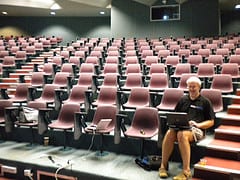(Photo credit Mikecogh - http://www.flickr.com/photos/mikecogh/4059881871/sizes/m/ CC-BY-NC-SA)
I’ve noticed an increase in interest in attendance monitoring in Universities recently, probably not unrelated to the UKBA’s withdrawal of London Metropolitan University’s trusted sponsor status. Throughout my career in HE, both as a student and staff, attendance has never really been compulsory, certainly not at lectures. Yet, there’s some evidence in the literature that students aren’t completely opposed to the idea. (Though they’re not wildly enthusiastic either.) See for example
NEWMAN-FORD, L., FITZGIBBON, K., LLOYD, S. and THOMAS, S., 2008. A large-scale investigation into the relationship between attendance and attainment: a study using an innovative, electronic attendance monitoring system. Studies in Higher Education, 33(6), pp. 699-717.
or
MUIR, J., 2009. Student attendance: Is it important, and What Do Students Think? CEBE Transactions, 6(2), pp. 50-69
Those are relatively small scale studies (There don’t seem to be any large scale studies, or if there are, I’ve missed them.) Outside the literature too, there’s some evidence that the issue is becoming significant. A web trawl found this post on a hyperlocal news blog in Newcastle which, when you look at the results doesn’t quite support the writer’s claim of “overwhelming rejection”. The rejection is of one particular model of monitoring. It would be very interesting to know how many other student unions have held similar referenda (and how they turned out). There’s also an interesting case in Texas where a school student has recently lost her case against her school district using an RFID chip to monitor her attendance.
To get back to HE though I did do a crude trawl of every UK university web site, to get a sense of what institutions were doing, and there are a small number of institutions (South Bank, Huddersfield, East London, and ironically enough, London Metropolitan) that do claim to have active electronic monitoring systems in place, although much more detailed research would be needed to assess the extent to which they are deployed in practice. There were a great many more institutions whose web sites linked to policy statements and papers which implied that they should do something about it. Over half the sites were silent on the topic, although web sites are a very limited source of data.
But, if this is a reaction to the Border Agency, it seems something of an over-reaction. I had a look at the Border Agency’s web site and they don’t require institutions to monitor attendance in the sort of detail that the South Bank system seems to be able to facilitate. All they require is that students are monitored at particular points in their academic career.
I’m not implying here that any institution is reacting inappropriately to the UKBA. There are good reasons to monitor student attendance. The articles I mention above draw on literature that suggests the existence of a correlation between attendance and academic attainment, although one would expect that stronger students would be more likely to attend classes. More compellingly it would certainly generate a great deal of useful planning data for universities, and I suspect it would “encourage” students to attend. While monitoring attendance of students is not the same as compelling them to attend, the existence of a monitoring programme would likely give the impression of compulsion. (And there are strong arguments against compulsion, which I will not rehearse here, except to point out that some elements of an educational experience are inherently compulsory. You can’t be assessed if you don’t present yourself, or at least your work, for assessment.)
It should also be acknowledged that a University education consists of rather more than lectures and seminars, which also raises some interesting questions. Should art schools monitor time spent in studios? What about virtual education? Does logging into the computer count as attending? Why not, if physical presence is the only measure of attendance in the “real” world? After all it’s quite possible to be physically present and mentally absent, as I can testify from personal experience. This is clearly a topic around which I’m going to have to put my thoughts in order. If anyone is doing any research in this area, please do comment.

You must be logged in to post a comment.